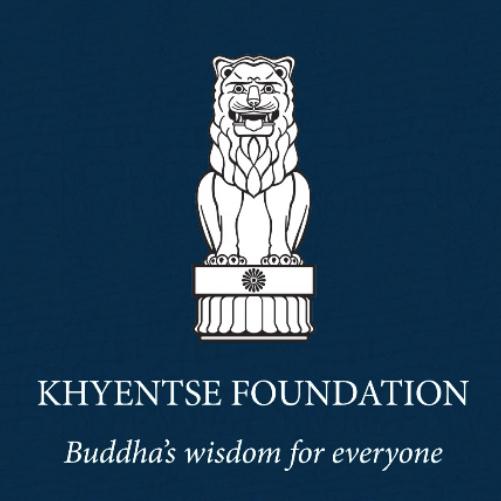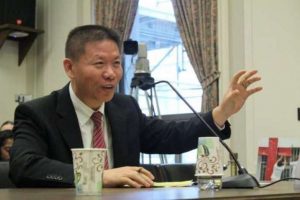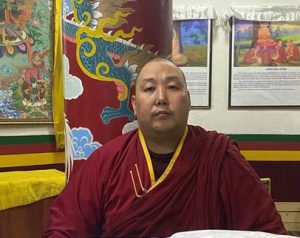
Khyentse Foundation, a nonprofit founded by the renowned Bhutanese lama, filmmaker, and author Dzongsar Jamyang Khyentse Rinpoche, has announced reaching the 20-year landmark of working in the service of the Buddhadharma. In its two-decade history, the foundation has founded a multitude of Dharma-based initiatives and projects in the realms of translation, academia, text preservation, training, and beyond, as well as establishing networks of support for Buddhist teachers, scholars, and practitioners.
“In the 20 years since Khyentse Foundation came into existence, we have had many opportunities to contribute toward the propagation and preservation of Buddha’s Dharma. However small, these opportunities are thanks solely to the blessings, kindness, and compassion of the Lion of the Shakyas and the merit of sentient beings,” Dzongsar Khyentse Rinpoche said in a statement published with the foundation’s annual report for 2021. “We read in the sutras that just before the beginning of a Dark Age, a girl offered a bell to ornament a stupa, the stupa that held the relics of the past Buddha, beautifying it so that it would attract the attention of passersby. Her offering involved nothing more sophisticated than hanging a silver bell on a rock. She neither studied nor practiced, yet her simple offering lengthened and strengthened the life of that Buddha’s teachings for eons to come.” (Khyentse Foundation)
Khyentse Foundation is a nonprofit organization founded by Dzongsar Khyentse Rinpoche in 2001 with the aim of promoting the Buddha’s teaching and supporting all traditions of Buddhist study and practice. The foundation’s activities include major text preservation and translation projects, support for monastic colleges in Asia, a worldwide scholarship and awards program, development of Buddhist studies at major universities, training and development for Buddhist teachers, and developing new modes of Dharma-inspired education for children.
“Over the past 20 years, we at Khyentse Foundation have had many causes to celebrate. We have been able to continuously support several traditional Buddhist monasteries, institutes, and meditation centers,” Rinpoche continued. “We have awarded open scholarships in Buddhist studies to more than 2,000 students. We have enabled hundreds of practitioners to focus on their practice full time. We were among the team of midwives who assisted at the birth of the 84000 translation project, which has become an authentic source of information about what Buddhadharma really is for future seekers of the truth. We have awarded 120 translation studies scholarships and endowed Buddhist chairs and centers for Buddhist studies at 36 world-class universities in 25 countries. We are delighted to be able to support Deer Park in Bir and Buddha Pada in Kalimpong, whose programs are reaching so many young people, and to have founded four schools for children: Middle Way School, Blue Lion Preschool, Kanishka School, and Lhomon Education.” (Khyentse Foundation)
The foundation’s achievements over the last 20 years include: more than 15 million pages of Buddhist texts preserved and made available online; education provided for the children of more than 1,000 families; support for Buddhist studies at more than 35 major universities through endowed chairs and professorships, graduate support, and the establishment of Buddhist studies centers; more than US$1 million in sponsorship for Buddhist teacher-training granted; sacred Buddhist texts translated into more than 15 languages, thanks to the efforts of 84000: Translating the Words of the Buddha, the Kumarajiva Project, and the Khyentse Vision Project; over US$1.8 million in funding granted to uphold Buddhism in its mother countries, including grassroots partnerships to revitalize interest in Buddhism in India; more than 2,000 scholarships and awards in recognition of excellence in Buddhist study and practice; support for over 3,000 monks and nuns to maintain the tradition of Buddhist scholarship in a monastic setting; and more than 120 open-access Ashoka and Trisong grants distributed to support Dharma and well-being programs.
“As Buddhists, perhaps our biggest challenge these days is not allowing ourselves to become discouraged—or even to consider giving up,” Rinpoche noted. “The past few years have been tough. It is my sincere aspiration, hope, and wish that we have all learned something from the challenges we have faced, and that the coming years will be far more fulfilling, spiritually, emotionally, physically, and materially.” (Khyentse Foundation)
Born in Bhutan in 1961, Dzongsar Khyentse Rinpoche is the son of Thinley Norbu Rinpoche and was a close student of the Nyingma master Dilgo Khyentse Rinpoche (1910–91). He is recognized as the third incarnation of the 19th century Tibetan terton Jamyang Khyentse Wangpo (1820–1892), founder of the Khyentse lineage, and the immediate incarnation of Jamyang Khyentse Chökyi Lodrö (1893–1959).
In addition to Khyentse Foundation, his projects include Siddhartha’s Intent, an international collective of Buddhist groups supporting Rinpoche’s Buddhadharma activities by organizing teachings and retreats, distributing and archiving recorded teachings, and transcribing, editing, and translating manuscripts and practice texts; 84000, a non-profit global initiative to translate the words of the Buddha and make them available to all; Lotus Outreach, which directs a range of projects to ensure the education, health, and safety of vulnerable women and children in the developing world; and Lhomon Society, which promotes sustainable development in Bhutan through education.
Rinpoche is the author of several books, including: What Makes You Not a Buddhist (2006), Not For Happiness (2012), The Guru Drinks Bourbon? (2016), and Poison is Medicine: Clarifying the Vajrayana (2021), and has garnered renown inside and outside of the global Buddhist community for the feature-length films he has written and directed: The Cup (1999), Travellers and Magicians (2004), Vara: A Blessing (2012), Hema Hema: Sing Me a Song While I wait (2016), and Looking For A Lady With Fangs And A Moustache (2019).
I want to express this wish that we will never stop working for Dharma. Because being concerned about the Dharma, working for the Dharma, propagating the Dharma that is also a practice. That is equally a practice and sometimes it may be even better than thousand hours of sitting or reciting mantras. So I hope that we will continue thinking this way and ACT.
— Dzongsar Khyentse Rinpoche
See more
Related news reports from BDG
Windows into Buddhism: Khyentse Foundation Announces Launch of New Book and Website
Buddha Path Hostel: Khyentse Foundation Announces a New Short Film on the Buddhist Teaching
Khyentse Foundation Celebrates 20 Years in the Service of the Buddhadharma
Khyentse Foundation’s Kumarajiva Project Shifts Focus to Training Translators
Khyentse Foundation’s Kumarajiva Project Marks 2nd Year with 7 Buddhist Texts Translated into Chinese
Khyentse Foundation Announces New Green Tara Sadhana eBook
Khyentse Foundation Launches Goodman Lecture Series
Khyentse Foundation Funds Tibetan Buddhist Studies Chair in Munich
Khyentse Foundation Launches New Initiative to Translate the Works of Jamyang Khyentse Wangpo
Khyentse Foundation Announces Online Publication of the Sutra of the Questions of Brahma in Chinese
Related features from BDG
Poison Is Medicine: Paradox and Perception in Vajrayana Buddhism
On Being Brave: Dzongsar Khyentse Rinpoche on Technology and the Dissemination of the Dharma
A Buddhist Vision for Education Reform: The Blue Lion Preschool, Inspired by Dzongsar Khyentse Rinpoche
Seeing the Sacred: an Interview with Pawo Choyning Dorji, Producer of Hema Hema: Sing Me A Song While I Wait
Modern Education and the Future of Buddhism: An Interview with Dzongsar Khyentse Rinpoche














